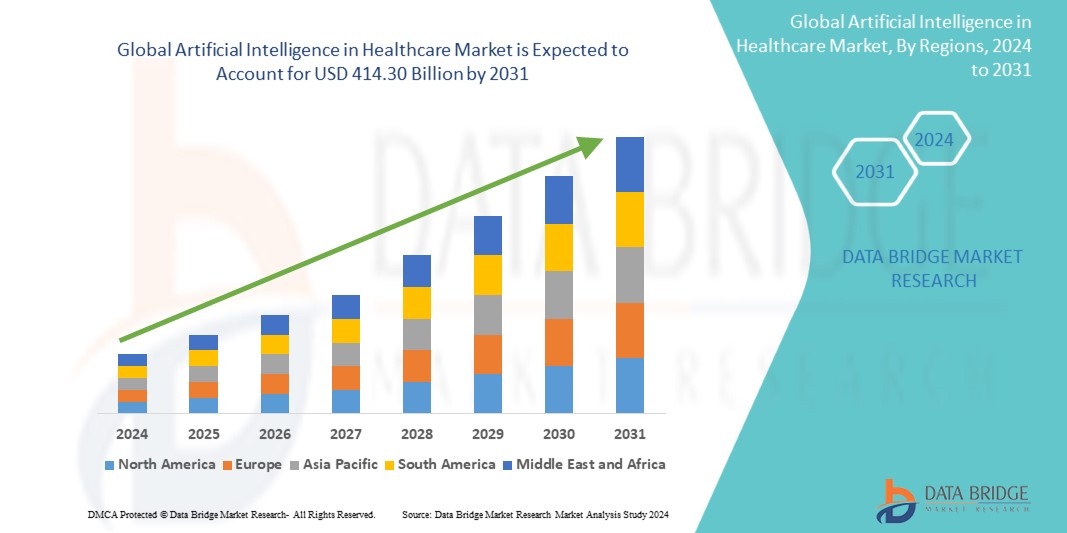The healthcare industry is undergoing a transformative change, thanks to the rapid advancements in Artificial Intelligence in Healthcare Market. From improving diagnostic accuracy to streamlining administrative processes, AI has emerged as a game-changer, driving efficiency and innovation across the sector. The global AI in healthcare market is poised for significant growth, with projections indicating a compound annual growth rate (CAGR) of over 40% in the next decade. This article explores the key drivers, applications, and challenges of AI in the healthcare market.
Key Drivers of Market Growth
- Rising Healthcare Costs The increasing cost of healthcare services has created a demand for technologies that can reduce expenses while maintaining quality care. AI offers solutions that optimize resource allocation, automate repetitive tasks, and enhance operational efficiency.
- Growing Data Availability With the proliferation of electronic health records (EHRs), wearable devices, and genomic data, the volume of healthcare data has skyrocketed. AI leverages this vast dataset to uncover actionable insights, enabling personalized treatment and predictive analytics.
- Advancements in AI Technologies Breakthroughs in machine learning, natural language processing (NLP), and computer vision have expanded AI’s capabilities in healthcare. These technologies empower systems to analyze medical images, interpret clinical notes, and predict patient outcomes with unprecedented accuracy.
- Supportive Government Policies Governments worldwide are promoting the adoption of AI in healthcare through funding initiatives, regulatory frameworks, and public-private partnerships. Such support accelerates innovation and facilitates market growth.
Applications of AI in Healthcare
- Diagnostics and Imaging AI algorithms are revolutionizing diagnostics by identifying diseases such as cancer, diabetes, and cardiovascular conditions with high precision. Radiology and pathology benefit significantly, as AI tools analyze medical images faster and more accurately than traditional methods.
- Drug Discovery and Development AI accelerates the drug discovery process by predicting molecule behavior, identifying potential drug candidates, and optimizing clinical trials. This reduces the time and cost associated with bringing new drugs to market.
- Patient Care and Monitoring Wearable devices and AI-powered applications monitor patients’ vital signs in real-time, alerting healthcare providers to potential issues before they escalate. AI also supports telemedicine platforms, enabling remote consultations and continuous care.
- Administrative Automation AI streamlines administrative tasks such as scheduling, billing, and claims processing. This allows healthcare professionals to focus more on patient care rather than paperwork.
Challenges and Considerations
- Data Privacy and Security The integration of AI in healthcare raises concerns about data privacy and security. Ensuring compliance with regulations such as HIPAA and GDPR is essential to protect sensitive patient information.
- Ethical Concerns The use of AI in decision-making processes, particularly in diagnostics and treatment, poses ethical dilemmas. Establishing transparency and accountability in AI algorithms is crucial.
- High Implementation Costs The initial investment required for AI solutions can be prohibitive for smaller healthcare providers. Strategies to lower costs and improve accessibility are necessary to drive widespread adoption.
- Skill Gap The lack of trained professionals to manage and implement AI technologies is another significant barrier. Educational programs and training initiatives are needed to bridge this gap.
Future Outlook
The AI in healthcare market is on the cusp of a paradigm shift. With continuous advancements in technology and increasing investments, AI has the potential to redefine how healthcare is delivered. As stakeholders navigate challenges related to ethics, cost, and privacy, collaboration between technology providers, healthcare professionals, and policymakers will be key to unlocking the full potential of AI in healthcare.
In conclusion, artificial intelligence is not just an auxiliary tool but a transformative force in the healthcare industry. By addressing existing challenges and embracing innovation, the global healthcare system can achieve better outcomes, improved patient experiences, and reduced costs—paving the way for a healthier future.
Get More Details: https://www.databridgemarketresearch.com/reports/global-artificial-intelligence-in-healthcare-market
Also Read
- ► How does Studying Abroad Lead To Personality Development?
- ► Exploring the World of Rajasthani Handicrafts
- ► Understanding British Citizenship Naturalisation: A Path to Becoming a British Citizen
- ► Motilal Oswal Mutual Fund: A legacy of Growth
- ► Best Things to Do in Lakshadweep for Couples
- ► What Are the Benefits of the Best SMO Service in India for 2025?
- ► TURKEY VISA FOR LIBYA CITIZENS
- ► How to Survive with a SaaS Product Like Airbnb Clone
- ► What is Azoospermia Treatment Through IVF-ICSI
- ► Examine the Most Recent Version of TM WhatsApp for a Better Chat Experience
- ► RumiGP: Your Gateway to Affordable Residential Plots in Ahmedabad
- ► Impact of MSME Registration on Tax Benefits and Subsidies
- ► What are USA Study Visa Requirements for Bangalore Students?
- ► Hellstar and Sp5der Clothing: Revolutionizing Streetwear
- ► 3 Best tool To convert and Download YouTube Videos




